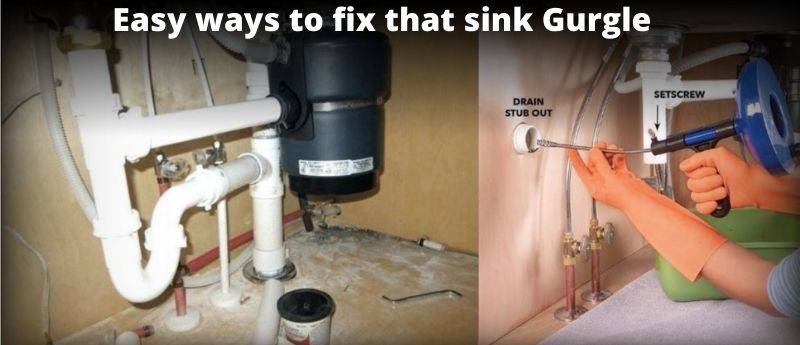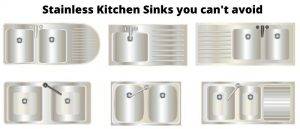It is very irritating to hear your sink gurgle every time you use it or after the water goes down the drain. To make matters worse, the gurgling sound may sometimes be very loud even to be heard by your visitors in the living room.
The gurgling of a sink is simply the running water sound that one hears under a kitchen sink. Well, today we explore why your kitchen sink gurgles and propose practical solutions that really work.
Gurgling, as heard from your sink pipes, depicts some challenges in the pipe drain. Let us start with why there is a gurgling sound on your kitchen sink.
Your kitchen sink gurgles because there is a blockage within the drain, which creates air bubbles as you pour water through the sink. The gurgling can also be caused when the sink drain is connected to the main drainage and the toilet flush sucks the water out of the sink trap at the u-bend pipe.
Never ignore when you hear such a sound, a repair is necessary. But, how does the gurgling or a blockage develop?
Also Read: Easily remove rust stains and yellow stains from your hot tub
What Causes Gurgling in the Kitchen Sink?
As you wash your dishes, small food debris released in the drain will stick in the pipe and accumulate to form more massive clogs.
Consequently, these clogs will obstruct the pipe system.
As you pour the water in the sink, the obstruction will trap the air around it to cause the bubbling sound.
It is essential to know how to dispose of the garbage since they are vital agents of forming clogs. For instance, eggshells, bones, grease, and hot oil.
Another cause of gurgling is a blocked vent pipe, connected under the sink pipe to eliminate sewer gas. This pipe runs to the roof.
Any blockage on this pipe comes from the items that come down from above, such as nests, leaves, etc.
As the vent pipe gets blocked, the sewer gas may push upwards within the pipe drain. The resultant scenario is the gurgling sound.
What to do if Kitchen Sink Gurgles and Smells
Since your sink is one of the busiest items in your household, it requires extra cleaning to maintain it in sound form.
Once you realize that there is an obstruction, take an immediate step to prevent it from developing to a full clog that can cause the smell.
Notably, there are two sources of a sink smell, as indicated below:
- Rotting food located in the junk stack in the drain pipe.
- The smell that comes from the gas which leaks in from the vent or trap.
A smelling sink can be irritating while interfering with the freshness of the interior atmosphere.
There are several methods that you can employ to get rid of the sink smell, such as:
Using a Bio-Enzyme Drain Cleaner
It is a natural substance that contains enzymes that will digest all the food particles in the drain without damaging the pipes.
A good example of a bio-enzyme drain cleaner you can use is the Drain and Grease Trap cleaner. We did a social media question and a number of respondents stated that it works.
Vinegar and Baking Soda
Take a half cup of baking soda and sprinkle it down the drain. After that, pour a full cup of vinegar into the drain.
Wait for a while as foaming happens. Finally, clear the drain by pouring hot water. From our reviews, we saw that Arm & Hammer Super Washing Soda is the best recommendation for such a solution.
Put Lemon Slices in the Disposals
It is in the right direction to run a citrus solution through the disposal to restore a pleasant smell.
However, back it with some other actions to prevent another encounter.
Sewer Gas Smell
If there is a blockage in the vent, make sure you get an expert to remove it if you can’t handle it alone. The unblocking will eliminate any leaking sewer gas to produce an unpleasant smell in the house.
How to Fix a Gurgling Sink
It can be frustrating if you experience running water sound under your kitchen sink without knowing what to do. Moreover, if you are in that situation, fret not, there is a solution for you to follow and overcome the challenge.
Therefore, if you want to stop the gurgling sound in your sink completely, it is crucial to observe the following:
Establish the Root Cause
If your sink experiences a gurgling noise, it may be due to several issues that may emerge. To hear it, you need a keen diagnosis of the gurgle by listening and observing.
The wisest step is to determine the root cause and fix it immediately to prevent some future costly repairs.
Well, the notable causes of sink gurgling may be either an improperly vented drain, or a partially clogged drain.
If you recently installed a sink, establish if proper installation took place. If some joints lacked proper connection and sealing, some air may enter to join the water flow. Certainly, gurgling happens.
Completely or Partially Blocked?
One of the early warnings that there is a blockage in the sink is gurgling. If you fail to take immediate action, the problem may become severe.
The first diagnosis is an odor that comes from the sink.
If you notice the above condition, then you can use an auger to clear the blockage. You can either buy sewer and plumbing auger and it will work just fine.
However, you can seek the services of an expert to prevent more complications. A plumber will check if the installation of the sink and the plumbing system were well done.
Troubleshoot
Once you discover the problem, you can quickly troubleshoot it and return the system to normalcy.
The areas where you can troubleshoot are as follows:
Troubleshoot the Sink Vent
What can you do if you drain the sink and still gurgling happens? Firstly, examine the venting of the sink.
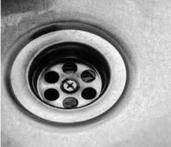
Chances may be that the vent installation distance from the P-trap may be wrong.
Each pipe’s size has its ratings. For instance, if you are using one and a half inch drain pipes, the vent distance from the bottom of the rap should be 3 ½ feet.
If the length exceeds that measure, a vacuum may develop, leading to a gurgling.
Alternatively, if the drain uses a valve instead of a vent to admit air, find out if it got stuck. The exact location of the valve usually is beneath or the back of the sink.
Troubleshoot the Main Vent
Blockage on the main vent may produce gurgling sounds at the sink.
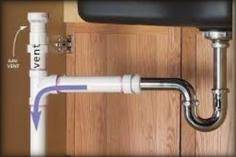 The best remedy is to clean the vent since the vacuum develops in strength within the drain trap and extend the odors.
The best remedy is to clean the vent since the vacuum develops in strength within the drain trap and extend the odors.
With the help of the auger, unblock the obstruction. In this case, the auger should be long to reach the sewer.
The blockage could be within that system, and unblocking will bring relief.
Another option is to clear the vent, starting from the roof. Spray water into the vent opening and observe if it could open the blockage.
When the air freely moves in the water pipes, there will be a natural flow of water.
Use the Chemical Clog Removers
You can purchase a chemical drainer from the home improvement stores and use it to clear clogs that result in gurgling.
The ideal drain cleaner should be compatible with your system, such as the septic tank. You can try the DISSOLVE Liquid Hair & Grease Clog Remover or any other de-clogger.
Suppose you may want to avoid the chemical drainer because you suspect it may damage your pipes then use an alternative.
The remaining option is to use an enzymatic cleaner, which is biodegradable.
The enzyme solution will not hurt your pipes, although the unclogging process is a bit slower than the chemical one.
While using a chemical drainer, leave it within the system for a while before flashing out the drain.
Take a precaution not to avoid using a plunger after pouring a chemical de-clogger. Your hands may be slashed by the chemical, leading to skin damage.
Also, avoid mixing different chemicals as they may produce dangerous fumes to you.
Worst cases may result in creating holes within the pipes, thereby inviting more challenges.
Add Vinegar and Baking Soda
Use around 180g of baking soda and pour it into the drain. Here, you can take advantage of a funnel to ensure it goes directly into the drain. Then again, pour two cups of boiling hot water into the drain.
The purpose of hot water is to get rid of grease or fat and help the baking soda to reach the clog fast.
After a while, add again a cup of baking soda, followed by a cup of vinegar. The Arm & Hammer Baking Soda can do this quite well. The foam will begin rising, so cover the drain with a plug.
Continue pouring hot water down the drain for the blockage to clear out. If you still hear the gurgling, then leave it. Add two to four cups of boiling water, which will clear out all the debris.
Take the Plunge
Locate the plunger and use it to solve the blocking issues in the sink.
 The plunger longer will suck the air out of the pipe and relaxes again to let the same air back still.
The plunger longer will suck the air out of the pipe and relaxes again to let the same air back still.
One of the best that we have found to be suitable for this job is the MPS4 Master Plunger by G.T. Water Products, Inc.
This is quite affordable and a real bargain considering the functionalities.
The resultant force will dislodge the blockage.
You can experiment if there’s no blockage by placing the cup on a plug hole.
Make sure the entire setting has a seal, then begin by driving the handle up and down as if you are pumping.
The blockage will be clear if the water in the sink starts to drain quickly.
Round the Bend
When the above methods fail, you will remove the U-bend and eliminate the debris in it by your hand. To succeed, you may need a plumber’s tape, a bucket, and a wire coat hanger.
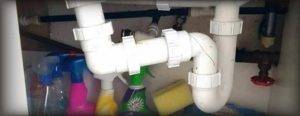
Begin by putting the bucket under a U-bend as you unscrew the pipe.
Loosen the ends of the U-bend as you collect the pending water in the bucket. Later, you can use the wire to clean the interior of the pipe. Use warm water too.
After the cleanup excise, reconnect the U-bend and make it watertight by using the plumber’s tape. Confirm the waterproof feature by running the tap.
Meanwhile, the above methods are general DIY (Do It Yourself) at home. If all the tips cannot work, you may consider calling a plumber to come and reach out to the bottom of the matter.
Be Observant and Take Action
It is essential to be observant while using the sink. Being sensitive to anything that sounds strange can prompt you to begin a diagnosis of the underlying problem.
You can carefully study the root cause and apply a suitable method to overcome it. You can learn how to unclog your kitchen sink from that article.
Here is a small catch: Whenever you experience a gurgling sound, act quickly to avoid other costly expenses that may result afterward.
The major causes of sink gurgling may develop from a blocked vent or a blocked drainpipe.
The consequences of sink gurgling are severe if you fail to take action as appropriate. The gurgling sound is an indicator that there is an inefficient process, crippled by some obstacles.
In this case, users can take advantage of the enzyme drain cleaner. Though the method is slow, it is eco-friendly.
Also, there some extreme cases that may prompt one to use a plunge. The method needs a little bit of physical energy to cause the plunge to suck the air.
Kitchen Sink Gurgles when Toilet is Flushed
A kitchen sink gurgling sound coming from a nearby toilet can be irritating. It also comes with a frightening feeling of the clog, causing water to back up into or under your floor or sink.
These are just some of the many troubles that befall homes if their drains get clogged. So, any homeowner needs to know how to deal with a clogged drain.
Also Read: Best Portable Whirlpool for Bathtub: with heaters for therapy
Why a Kitchen Sink Gurgles after Flushing the Toilet?
There are several reasons why the kitchen sink gurgles when the toilet is flushed, and each requires a different solution.
Your kictehn sink gurgles after flushing the toilet because the drain vent could be blocked, you have a clogged drain or your plumbing lines have trapped in some iar. Actually, the major cause of the gugle is that the air is passing through the P-trap in the sink.
These causes are as explained below:
1. Drain Vent Pipe Blocked
The drain vent pipe runs from the roof of the house to a drainage line inside the home. When this pipe becomes blocked by debris, water drains back into the plumbing system, causing gurgling.
To fix this problem, inspect for debris in the drain vent pipe and clean it out if necessary. It is close to the toilet where you can access it through a crawl space or attic.
2. A Clogged Drain Line
When the drain line becomes clogged with grease, tissue paper, or other debris, it causes water to overflow into the pipes that connect to other fixtures in the home. Check under sinks for clogs and clear them with a plunger or chemical cleaner if necessary.
3. Air Trapped in Plumbing Lines
Air sometimes gets trapped in plumbing lines, causing gurgling sounds when water flows through them.
Turning on another faucet as another fixture is running helps release any trapped air in the pipes. Yes, the leading cause of your sink gurgling while flushing the toilet is this air.
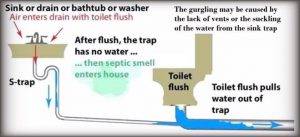
The blockage might be in the vent, which results in negative pressure in the pipes.
As the water flows in the toilet waste pipe, it causes a vacuum. Typically, there is equal pressure between the sink and the toilet vent. The two later connect to a common vent.
When the common vent blocks, the vacuum will begin to pull the air via the sink trap.
Later, you will start hearing the gurgling sound as a result of the presence of the air that is passing via the trap’s water.
How to Fix sink Gurgling when a Toilet is Flushed
Fixing a gurgling kitchen sink is a quick and simple task that anyone can do. Before you dive into the project, you will need a few things.
- A screwdriver
- A plunger
- Pipe cleaner
- Water hose
- Bucket
- Plumber’s tape or putty
- Drain snake or auger
Procedure
If the vent pipe may be clogged, then you should do the following. Locate a bird feeder on your deck or patio, and use a leaf blower to blow the seed hulls out of the vent pipe.
If you have a backwater prevention valve installed in your house, it might be clogged with debris.
Unscrew it from the house drainpipes, and have someone flush a toilet while you watch for water coming out of the threaded part of the backwater valve. If water does not come out, then clean out the backwater valve.
Also, you could install an air admittance valve (AAV) into the farthest arm of the wye fitting that joins the main sewer line to your home’s drainpipes.
That way, any soil gases that enter through either side of your wye fitting will flow into the AAV directly.
Other checks are:
- Check the vent outside your home.
- Clean out the sink vent.
- Remove debris from the toilet P-trap and drain.
- Flush the toilet while blocked with a rag.
- Install an air admittance valve to prevent gurgling in the future.
Conclusion
Sink gurgling is a common challenge among many homes. The good news is that there are home remedies that one can utilize as DIY and prevent further complications.
From this, you will realize that you can unblock the system and prevent further gurgling.
Therefore, the irritating issue of sink gurgling has several remedies. When you apply any of the solutions, as mentioned earlier, you may give a big blow to the gurgling sink problem.
When correcting the running water sound under kitchen sink, remember to stick all the procedures to get better results.
Also Read: 12 Best Portable Bathtubs: Safe for Adults, Kids and Seniors
FAQs on Sink Gurgling
Why do sink gurgles but drains fine?
When the sink produces a gurgling sound, it means that the air may be escaping from the drain. Do you know that this air should not be in the system?
This air, which is within the pipe system, experiences a pull or a push in the drain’s P-trap.
When the exit does not have a complete air passage, the air pressure and the obstruction will trigger suction in the drain. The process will pull the water within the P-trap while producing a sound.
This obstruction in the drain is the number one cause of the sink gurgling. The obstruction materials like grease, food particles, and hair are critical if found in the drainpipe.
You can avoid them by disposing of them in another form. Therefore, if the obstruction is small, the drainage will still happen within the sink water while gurgling simultaneously.
However, as the clog develops to narrow the opening, the sink water will move slowly, but gurgling will not stop.
The full blockage in the pipe drain will cause the sink water to stagnate in the system and eventually begin to smell.
Why does my sink gurgle when my dishwasher drains?
Gurgling is a significant indicator that the water may be trying to penetrate through an obstacle. It is reasonable to find out the right location of the clog.
Mostly, the blockage is usually within the sewer line or within the dishwasher itself.
Take quick action to sort of the mess since the challenge may expand to cause a wholly clogged dishwasher.
You can start by stopping the dishwasher. Then, reach out to the sink to ensure that there are no foods that may cause the clogs.
Sometimes water may still be resisting the bottom of the dishwasher when you open it. When leftovers in the dishwasher accumulate, they interfere with proper drainage of the system.
It may be better to call an expert to establish the causes of any clogging in the dishwasher. If such problems persist, consider installing an offset type of a sink because such sinks have lessor challenges like these.
Still, you may open the dishwasher only to discover that the dishes are unclean. The probable assumption maybe that water was not to its full level.
Or else, a clog may be on the second line in the sink or the mainline. Clogging will cause your dishwater to gurgle.
What should I do when I notice a gurgling sink?
If you have a gurgling sink, you first need to familiarize yourself with the problem, try to use a suitable method to minimize it to level zero.
For example, you can use a chemical drainer if you want to unclog the pipe quickly.
In some situations, you may not want to cause some damage to the pipe, so you use an alternative to chemical draining.
Watch how to diagnose your sink for that gurgle


As a homeowner, I am specifically keen on home improvement. I am passionate about homes, yards, and home improvement. I blog on home ideas and reviews on solutions that make homes better.
